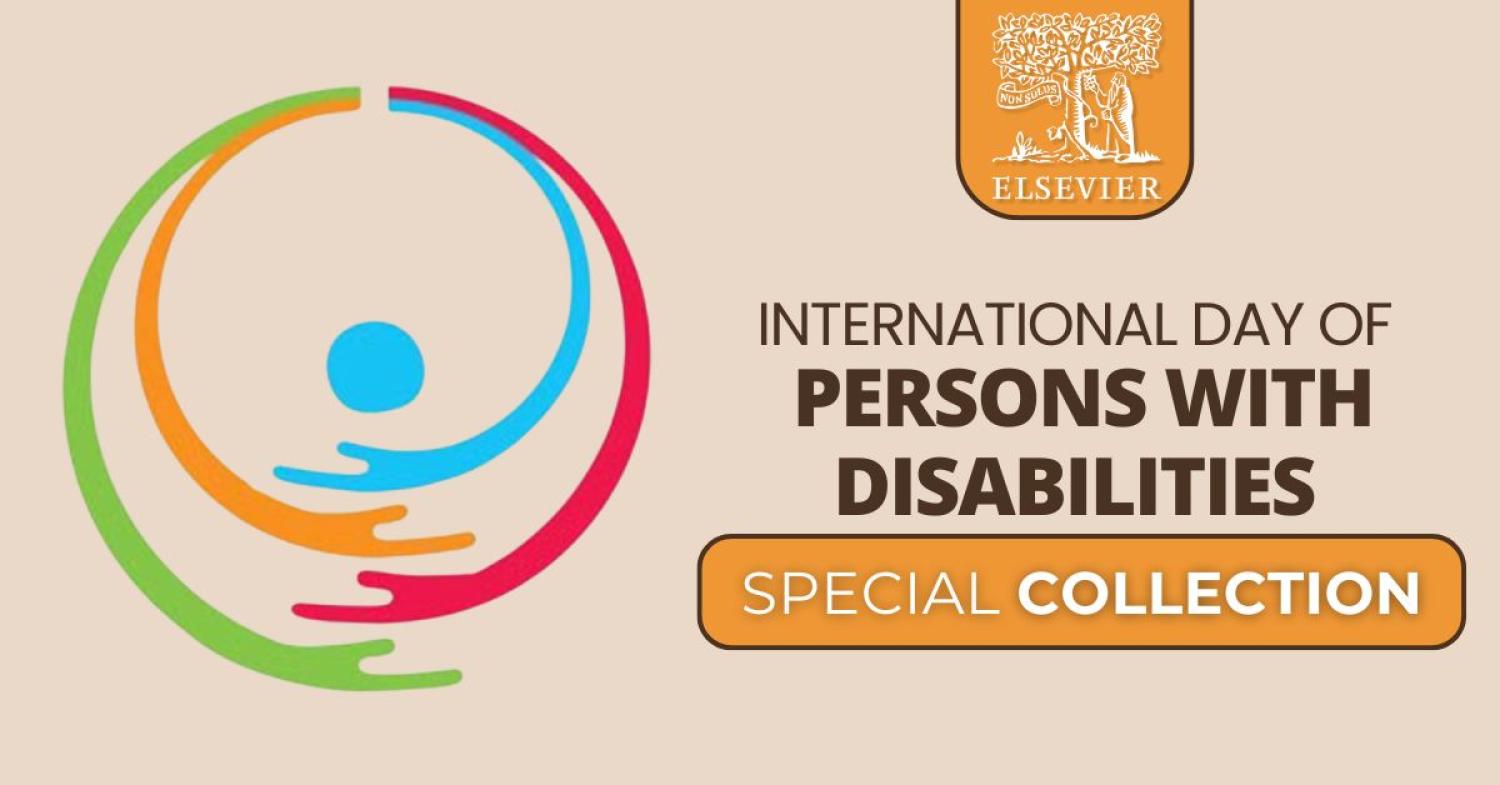
The annual observance of the International Day of Disabled Persons was proclaimed in 1992, by the United Nations General Assembly resolution 47/3. The observance of the Day aims to promote an understanding of disability issues and mobilize support for the dignity, rights and well-being of persons with disabilities. It also seeks to increase awareness of gains to be derived from the integration of persons with disabilities in every aspect of political, social, economic and cultural life.
The Lancet Regional Health - Western Pacific, Volume 52, November 2024
The Lancet Rheumatology, Volume 6, September 2024
The Lancet Regional Health - Western Pacific, Volume 49, August 2024
The Lancet Neurology, Volume 23, July 2024
The Lancet Global Health, Volume 12, May 2024
The Lancet Regional Health - Americas, Volume 32, April 2024
The Lancet Global Health, Volume 12, February 2024
eClinicalMedicine, Volume 67, January 2024
Journal of Fluency Disorders, Volume 77, September 2023
Computers and Composition, Volume 68, June 2023
Journal of Communication Disorders, Volume 102, 1 March 2023
eClinicalMedicine, Volume 57, March 2023
The Lancet Regional Health - Americas, Volume 18, February 2023
The Lancet Regional Health - Southeast Asia, Volume 25, June 2024
The Lancet Regional Health - Southeast Asia, Volume 17, October 2023
Language and Health, Volume 2, Issue 2, December 2024,
This study provides insight into the perspectives on languages and modalities that emerge when (hearing) health professionals meet deaf parents with their babies in health centres, even with a sign language interpreter present.
The Lancet Regional Health- Southeast Asia, Volume 25, June 2024
This study findings emphasizes the need for community-level awareness programs to improve anthropometric well-being and healthcare of the children with disability.contributing to the global disability discourse, the study underscores the significance of context-specific investigations for impactful interventions.
The Lancet Oncology, Volume 23, Issue 4, April 2022, Pages e174-e183
This Series of 2 papers in The Lancet Oncology addresses the urgent need to pay specific attention to the challenges and disparities faced by people with disabilities suffering from cancer. The authors highlight the need to improve the effectiveness and timeliness of cancer screening, diagnosis, treatment, and outcomes to provide more equitable cancer prevention and care.
The Lancet Oncology, Volume 23, Issue 4, April 2022, Pages e164-e173
This Series of 2 papers in The Lancet Oncology addresses the urgent need to pay specific attention to the challenges and disparities faced by people with disabilities suffering from cancer. The authors highlight the need to improve the effectiveness and timeliness of cancer screening, diagnosis, treatment, and outcomes to provide more equitable cancer prevention and care.
JSAMS Plus, Volume 3, June 2024
The primary objective of this randomised controlled trial is to quantify the effect of tDCS and exercise on pain, disability and quality of life in people with hip OA. Our secondary objectives include: 1) quantifying the influence of motor cortex excitability and conditioned pain modulation on treatment effects, and 2) quantifying the economic cost/benefit of tDCS for improving health-related quality of life in people with hip OA.
Linking Neuroscience and Behavior in COVID-19, 2024, Pages 39-48
This content aligns with Goal 3: Good Health as well as Goal 10: Reduced Inequalities by providing research on disabilities to help prepare for future public health disasters. It also promotes inclusive leadership and implementation that considers the needs of people with disabilities.
Advances in Transport Policy and Planning, Volume 13, 2024, Pages 47-87
International Review of Research in Developmental Disabilities, Volume 66, 2024, Pages 1-31
International and Life Course Aspects of COVID-19, 2024, Pages 419-428
Genomics in the Clinic: A Practical Guide to Genetic Testing, Evaluation, and Counseling, 2024, Pages 493-494
This case study aligns with Goal 3: Good Health by highlighting the importance of accurate diagnosis and understanding of genetic conditions, which can lead to better health management and support for individuals with psychosis and learning disabilities. Additionally, it aligns with Goal 10: Reduced Inequalities by emphasizing the need for equitable access to healthcare and resources for individuals with complex health needs, ensuring that they receive appropriate care and support tailored to their specific conditions.
Resilient Health: Leveraging Technology and Social Innovations to Transform Healthcare for COVID-19 Recovery and Beyond, 2024, Pages 713-727
Neuropsychiatric Disorders and Epigenetics: Translational Epigenetics, Second Edition, 2024, Pages 103-124
Rehabilitation Robots for Neurorehabilitation in High-, Low-, and Middle-Income Countries: Current Practice, Barriers, and Future Directions, 2024, Pages 167-178
Retinal and Choroidal Vascular Diseases of the Eye, 2024, Pages 375-390
Handbook of Clinical Neurology, Volume 202, 2024, Pages 153-167
Principles of Neonatology, 2024, Pages 699-705
Advances in Child Development and Behavior, Volume 66, 2024, Pages 233-268
Neurogenetics for the Practitioner, 2024, Pages 305-325
Low Vision: Principles and Management, 2024, Pages 180-188
This content aligns with Goal 3: Good Health by detailing specialized training techniques that can enhance the quality of life for individuals with visual field loss, thereby improving their ability to navigate their environment and engage in daily activities. By focusing on tailored interventions such as eccentric viewing, visual exploration, and scanning training, the chapter promotes effective rehabilitation strategies that contribute to better health outcomes for those affected by visual impairments. Additionally, it supports Goal 10: Reduced Inequalities by ensuring that individuals with visual field loss have access to adaptive training methods, which can empower them to lead more independent and fulfilling lives, regardless of their socioeconomic status or background.
Computational Intelligence and Deep Learning Methods for Neuro-rehabilitation Applications, 2024, Pages 121-148
Additive Manufacturing Materials and Technology: Additive Manufacturing Materials and Technologies, 2024, Pages 341-357
Atlas of Common Pain Syndromes, Fifth Edition, 2024, Pages 524-528
This content aligns with Goal 3: Good Health by addressing the complex phenomenon of phantom limb pain, which can significantly affect the quality of life for individuals who have undergone amputations. By understanding the mechanisms behind this condition and the varied experiences of patients, healthcare providers can develop more effective pain management strategies and psychological support systems, ultimately improving patient outcomes. Additionally, it supports Goal 10: Reduced Inequalities by highlighting the need for tailored medical interventions that recognize the unique challenges faced by amputees, ensuring that all patients, regardless of their background or circumstances, receive comprehensive care that addresses both physical and emotional aspects of their recovery.
Nutraceutical Fruits and Foods for Neurodegenerative Disorders, 2024, Pages 151-171
Principles and Practice of Pediatric Sleep Medicine, Third Edition, 2024, Pages 167-174
This content aligns with Goal 3: Good Health by highlighting the significant impact of sleep disorders on the physical, cognitive, and emotional well-being of children with autistic spectrum disorders (ASDs) and their families, emphasizing the importance of effective interventions such as parent-directed behavioral strategies and the careful use of melatonin. By advocating for a collaborative approach to treatment planning that involves parents and children, the content promotes a patient-centered model of care that can lead to better health outcomes. Additionally, it supports Goal 10: Reduced Inequalities by addressing the specific needs of children with ASDs and their families, ensuring that they have access to appropriate and evidence-based interventions that can improve their quality of life and reduce disparities in healthcare access and treatment effectiveness.
Symptomatic: The Symptom-Based Handbook for Ehlers-Danlos Syndromes and Hypermobility Spectrum Disorders, 2024, Pages 135-144
Advances in Pharmacology, Volume 99, 2024, Pages 251-286
The Psychology and Neuroscience of Impulsivity, 2024, Pages 183-196
Principles of Neonatology, 2024, Pages 802-811
Impact of Climate Change on Social and Mental Well-Being, 2024, Pages 75-89
Promoting Desired Lifestyles Among Adults with Severe Autism and Intellectual Disabilities: Person Centered Applications of Behavior Analysis, 2023, Pages 217-243
This content aligns with Goal 3: Good Health by providing readers and application of behavior analysis to treat challenging behavior specifically in a person-centered manner.
Understanding Autism: Perspectives, Assessment, Interventions, and the Journey Towards Inclusion, 2025, Pages 91-107

